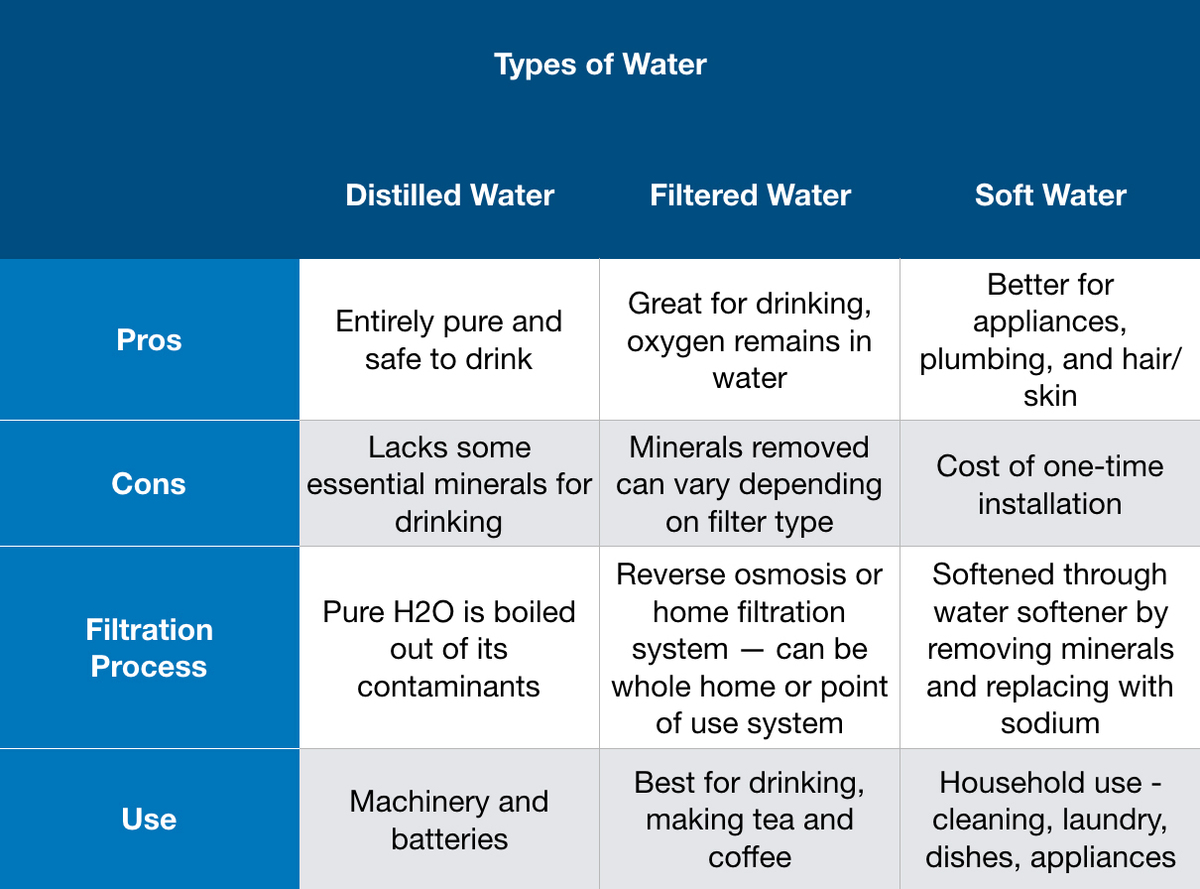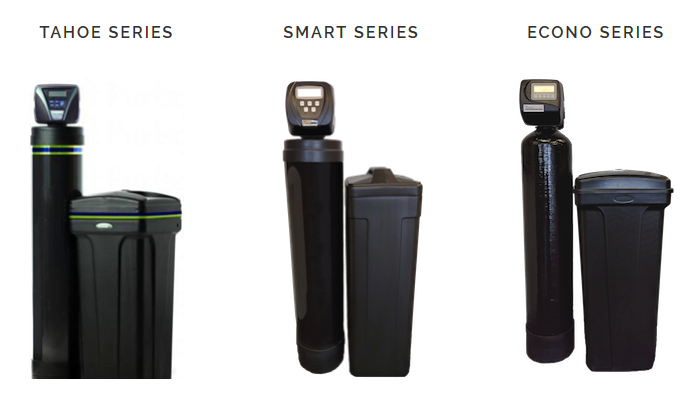Distilled Water vs Water Softener vs Filtered Water
Have you ever wondered what sets distilled, softened, and filtered water apart? While they may seem similar, each type of water undergoes a unique treatment process that affects its purity, mineral content, and overall benefits.
Whether you're looking for the best option for drinking, cooking, or household use, understanding the differences can help you make an informed decision. Keep reading to learn about distilled water vs. a water softener vs. filtered water.
2. Soft Water
4. Essential Home Water Products for a Comfortable Winter
WaterSmart professionals can provide you with the knowledge you need so that your home can be equipped with the right tools and information to keep your water soft and safe, which will keep you healthy.
Contact the local experts at WaterSmart today to check your water quality.
Everything you need to know about Distilled Water vs. Filtered Water vs. Soft Water
1. DISTILLED WATEr
what is distilled water?
Spring water contains minerals, whereas, distilled water has all these minerals and impurities removed.
It works excellent in machinery because it won't leave any mineral buildup. Some people also enjoy drinking it, but most people have switched over to purified water.
How is Water Distilled?
Distilled water is filtered by boiling the water to separate the water molecules from other elements, like hard minerals.
The pure water vapour is then separated from the contaminants so that it is entirely purified.
Because various liquids and solids have different boiling points, distillation allows the water to be separated from all other minerals and impurities.
Benefits of Distilled Water
Because impurities are removed from distilled water it makes it pure and safe for use in medical and chemical applications.
Distilled water is safe to drink, but you may leave out healthy minerals from your diet by drinking only distilled water. Minerals like calcium, fluoride, and magnesium are important in an everyday diet.
Minerals are removed from distilled water.
2. Soft water
What is Soft Water?
Soft water is water that was previously "hard" and has been softened through a filtration process. Hard water contains minerals that can make cleaning chores difficult, and damage our plumbing and appliances.
Benefits of Soft Water
There are a number of benefits of having soft water. Soft water eliminates buildup on faucets, pipes, and appliances.
Soft water is also better and more efficient for cleaning your skin and hair. Overall, soft water even decreases water-related costs.
As well, water softening makes water heating easier, therefore decreasing the cost of your water heating bill.
How is Water Softened?
Water is softened when calcium and magnesium ions are removed from the water and replaced by sodium.
This process occurs when hard water enters the resin tank. The resin beads then attract the calcium and magnesium ions like a magnet. This separates the ions from the water and the impurities are replaced with sodium, making the water soft.
The high-quality water softeners we carry.
3. FILTERED WATER
What is Filtered Water?
Filtered water is a happy mix between spring water and distilled water. It is very close to the same quality as distilled water given that the impurities have been removed. However, the water still contains oxygen so it has some life to it if you're drinking it straight.
It makes for excellent tea, coffee and juices because the lack of minerals allows for more flavour.
Benefits of Filtered Water
Along with tasting better, filtered water has been purified from health risks due to unwanted contaminants.
Because it is free of unwanted contaminants it is beneficial health-wise and is overall the best type of water for drinking.
How is Water Filtered?
Water is filtered in a number of ways. Filtration means that the water has gone through a purification process to get rid of unwanted minerals and contaminants. Water can be purified through reverse osmosis or a water softener.
What is Reverse Osmosis?
Reverse osmosis (R/O) is a water treatment process which takes tap water and forces it through a semi-permeable membrane that has very small holes or "pores."
Clean water then passes through the membrane and impurities that are too big to pass through are left behind and flushed away. Click here to read more about how reverse osmosis works.
Reverse osmosis is a tap filtration system.
4. Essential Home Water Products for a Comfortable Winter
As temperatures drop, having the right water-related equipment in your home can make a significant difference in your comfort and convenience. From ensuring warm showers to preventing frozen pipes, investing in the right water products can help you get through the winter months with ease. Here are some essential home water solutions to consider:
1. Water Heaters
A reliable water heater is a must-have for winter. Whether you use a traditional storage water heater or a tankless system, having access to hot water is essential for bathing, washing dishes, and doing laundry during colder months. If your current water heater struggles to keep up, it may be time to upgrade to a more efficient model.
2. Hot Water Recirculation Systems
A hot water recirculation system reduces wait times for hot water at your faucets, which not only improves comfort but also prevents excessive water waste. This system keeps hot water circulating through your pipes, so you don’t have to let cold water run before it heats up.
3. Whole-Home Water Softeners
During winter, hard water can make your skin feel drier and irritate conditions like eczema. A water softener helps by removing minerals like calcium and magnesium, leaving your water gentler on your skin and hair. Softened water also prevents scale buildup in your pipes and appliances, extending their lifespan.
4. Insulated Pipe Wraps and Heating Cables
Frozen pipes are a common winter problem that can lead to costly repairs. Insulating your pipes with foam wraps or using heating cables can help prevent freezing and ensure a steady flow of water even in subzero temperatures.
5. Humidifiers with Filtered Water
Winter air tends to be dry, which can cause respiratory discomfort, dry skin, and static electricity in your home. Using a humidifier with filtered water helps maintain optimal humidity levels, keeping the air in your home comfortable while reducing the risk of mineral buildup inside the device.
6. Reverse Osmosis and Filtration Systems
Winter weather can impact water quality, especially if your home relies on a well or municipal supply affected by seasonal changes. A reverse osmosis or high-quality filtration system ensures you have access to clean, great-tasting water for drinking and cooking throughout the colder months.
By equipping your home with the right water-related products, you can stay comfortable all winter long while also protecting your plumbing system and improving water quality. If you're unsure which solutions are best for your home, consulting a water treatment professional can help you make the right choice.
Trust WATERSMART - WE TAKE WATER SERIOUSLY
Since 1994, WaterSmart Systems has consistently offered its customers in the Kitchener, Waterloo, Cambridge, Guelph, and surrounding areas innovative, quality products and excellent service.
We are a water softener and full plumbing service company that you can trust. We offer products that will serve all of your home water softening needs and we value our customers. This is why we ensure that they get what they need and we do not pressure them for sales.
At WaterSmart we take our role in providing our customers with an adequate supply of clean drinking water seriously.
If you have questions about your water quality or the type of water you need, come see us or give us a call to find out how we can help improve the quality of your water.
If you are concerned about your water supply, don't hesitate to contact us immediately.
Trust WaterSmart - we know good water, and we know how to make sure you get it.
“
Purchased a water softener, price was reasonable, sales staff was very informative and not pushy. Install was quick and clean and he gave instructions on the unit. I would highly recommend Watersmart Systems.”






